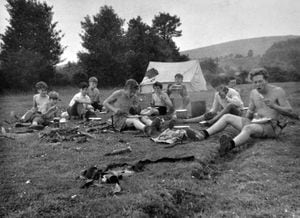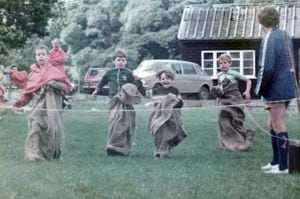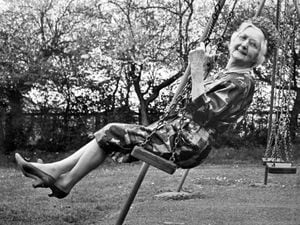The Long Mynd adventure camp which changed youngsters' lives
First came the adventure in the Shropshire hills, then came the thank you letters.

The young lads from underprivileged backgrounds in Wolverhampton, Birmingham, and the Black Country, had never seen anything like it.
Plonked in tents in the shadow of the Long Mynd, they washed in a brook, sang round a camp fire, roamed the countryside, played games, and generally enjoyed the fresh air.
This was the Longmynd Adventure Camp - Longmynd is spelt as one word in its title - which this year is celebrating its diamond anniversary.
"Dear Mr Bill Williams, I'm so glad you had invited me to stay at the camp for 10 days. Thank you for the food that we had. Will you write back to say that we did see a ghost, because my mum doesn't believe me," wrote Andrew Buxton, of Shirley, Solihull, afterwards.
"Dear Skipper, I hope you are feeling well. Thank you for the beautiful holiday that you gave me and for the songs that your learned me and thank you for the lemonade and the book prize," wrote Clive Pearce of Tent One.
And another letter, from a helper: "Dear Sir, As you can see by the above address (Her Majesty's Prison, The Dana, Shrewsbury) things have changed for me since our last meeting... I will always remember all the great songs we sang, especially your daughter Debbie's favourite, 'There's A Worm At The Bottom of the Garden.' Brilliant!
"...I am sorry for letting you down Mr Williams..."

The late Bill Williams was the Shropshire country policeman who started it all, with his idea of giving a camping holiday for underprivileged boys from the urban areas of the West Midlands. It linked up with a holiday scheme run by the then Women's Voluntary Service.
Bill was from a tough background himself. He was brought up in a two-up two-down terrace house - now demolished - at 104 High Street in Wellington.
With no water supply or bathroom, they had a tin bath, and the toilets were earth closets at the top of the yard.
He was only five when his father died, leaving his mother struggling to feed and clothe the family on a widow's pension.
In the first camp some boys stayed in tents in the garden of his police house at Wistanstow, near Craven Arms, in 1958, which gave him the idea to run a venture which would give holidays to young boys who had never had a holiday.

Thanks to helpful farmers, from then on annual camps were held at a number of different locations in the shadow of the Long Mynd.
At the time it all began, Alan Scriven was a five-year-old living in poverty in a single-parent family at Fifth Avenue in Low Hill, Wolverhampton.
When he first went to the camp in 1965 it was to change his life - so much so that he was to follow Bill as its "Skipper" and Alan - "Scriv" - was to be awarded the MBE for his 33 years' involvement.
Alan, who worked for a time as traffic manager at the Midland Red/Arriva bus depot in Wellington, wrote a book detailing the story of the camp, but has now penned a follow-up, called More From The Longmynd Adventure Camp and Me.
This taps into correspondence, newspaper articles, and contemporary accounts from some of the voluntary members of staff.
There was, incidentally, a girls' camp started around the late 1960s which Alan says did not stand the test of time for various reasons, "one of them being the unsatisfactory behaviour of the young ladies - bless them!"

Some of those from Bill and Alan's times are now planning a 60th anniversary celebration.
Alan, who lives in Moseley, Wolverhampton, writes: "The Longmynd Adventure Camp changed a lot of people's lives, not just the lads who were lucky enough to be selected - some, like me, time and time again - as well as many of the kind souls who came along at different parts of the camp's then life who willingly offering whatever they could to help the lads enjoy the experience.
"This now 60-year-old organisation gave a truly unforgettable experience to everyone who was ever a part of it."
Alan's book is published by Heddon Publishing.





